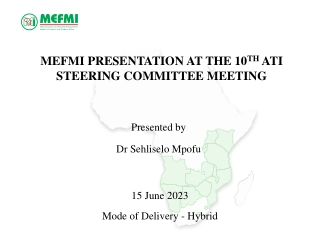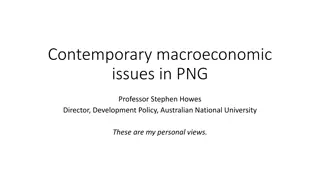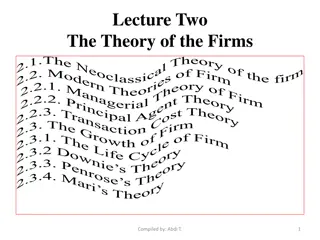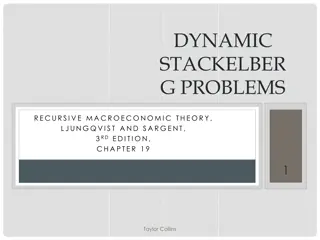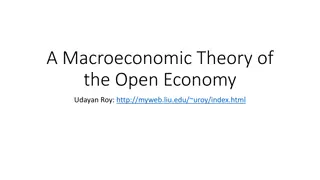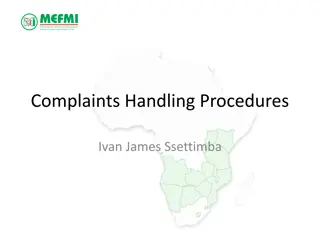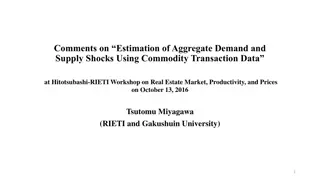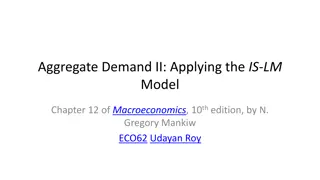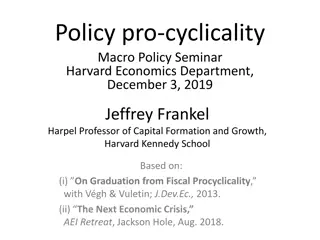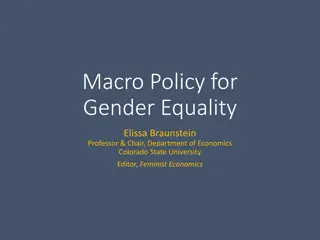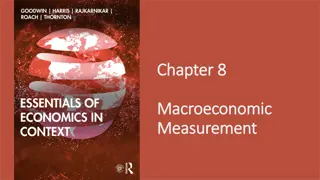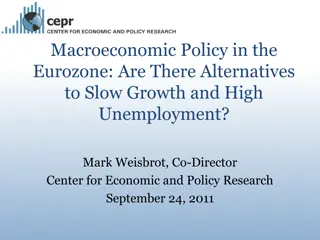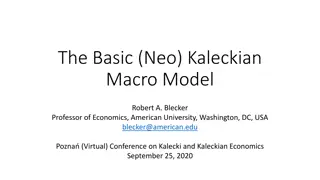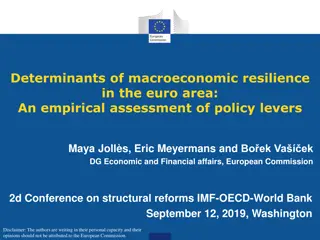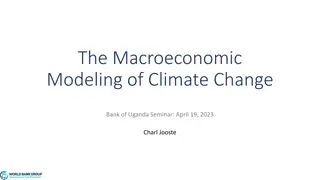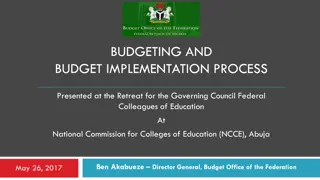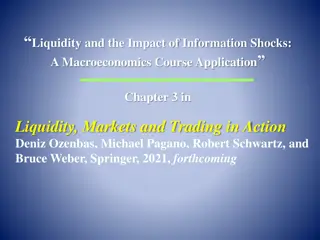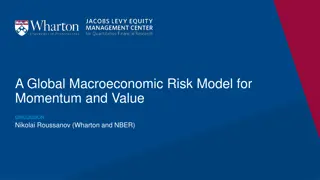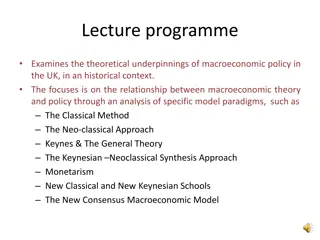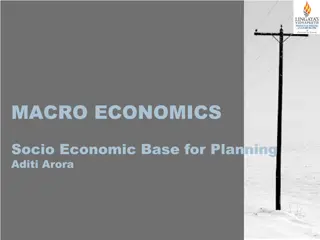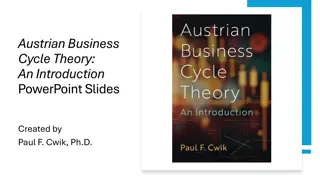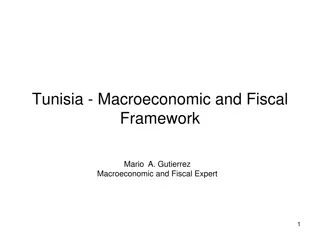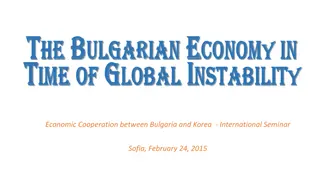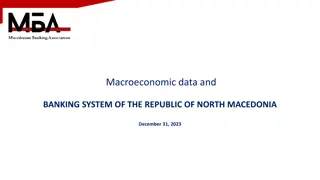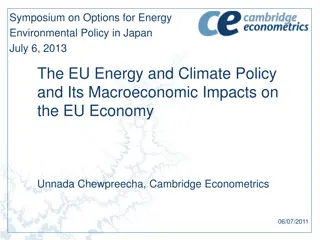MEFMI Presentation on Collaboration and Capacity Development with ATI and IMF
The Macroeconomic and Financial Management Institute of Eastern and Southern Africa (MEFMI) presented on their collaboration with the African Training Institute (ATI) and the International Monetary Fund (IMF) at the 10th ATI Steering Committee meeting. The collaboration includes joint regional cours
1 views • 7 slides
Analysis of Contemporary Macroeconomic Issues in Papua New Guinea
Professor Stephen Howes, Director of Development Policy at Australian National University, presents his personal views on macroeconomic issues in Papua New Guinea. The focus is on the exchange rate regime and its management, excess liquidity, and fiscal policy. Various economic indicators point to c
2 views • 48 slides
Evolution of Mathematical Theories and Proof Systems
Development of mathematical theories such as model theory, proof theory, set theory, recursion theory, and computational complexity is discussed, starting from historical perspectives with Dedekind and Peano to Godel's theorems, recursion theory's golden age in the 1930s, and advancements in proof t
3 views • 29 slides
Psychological Theories of Criminality: Understanding the Roots
Psychological theories of criminality delve into the association between intelligence, personality, learning, and criminal behavior. Major theories include Psychodynamic Theory by Freud, Behavioral Theory by Bandura, and Cognitive Theory by Kohlberg. These theories explore how unconscious mental pro
1 views • 20 slides
Theory of Firms: Neoclassical vs. Modern Approaches
The theory of firms is explored through the Neoclassical and Modern perspectives. Neoclassical theory focuses on profit maximization, while Modern theory delves into managerial, principal-agent, and transaction cost theories. The discussion covers criticisms of Neoclassical theory and the essential
1 views • 79 slides
Dynamic Stackelberg Problems in Macroeconomic Theory
A new type of problem in economic theory known as Dynamic Stackelberg Problems is discussed, focusing on optimal decision rules, rational expectations equilibrium, and the Stackelberg leader and follower concept. The government's one-period loss function, solving methods, and dynamics of Lagrange mu
0 views • 15 slides
Macroeconomic Theory of the Open Economy by Udayan Roy
This presentation discusses key concepts related to the open economy, such as net exports equaling net capital outflow, national saving equaling domestic investment plus net capital outflow, the loanable funds theory of the real interest rate, and the relationship between saving, investment, and net
0 views • 31 slides
Evolution of Light Theory: From Wave Theory to Quantum Theory
At the turn of the century, the discovery of the photoelectric effect challenged the wave theory of light, leading to the development of the quantum theory by Max Planck and Albert Einstein. This new theory introduced the concept of discrete energy units known as quanta, bridging the gap between wav
3 views • 62 slides
Complaints Handling Procedures at Macroeconomic and Financial Management Institute
Effective complaints handling is essential for feedback and improvement in financial services. Learn about the benefits, principles, and responsibilities involved in managing complaints at the Macroeconomic and Financial Management Institute of Eastern and Southern Africa.
0 views • 21 slides
Estimation of Aggregate Demand and Supply Shocks Using Commodity Transaction Data
This study presented at Hitotsubashi-RIETI Workshop analyzes demand and supply shocks using commodity transaction data. By estimating elasticity parameters and examining movements in price and quantity, the research identifies negative supply shocks post-global financial crisis and after 2013. The p
0 views • 8 slides
The IS-LM Model for Macroeconomic Analysis
The IS-LM model, discussed in Chapter 12 of Macroeconomics, helps analyze how an economy responds to policy changes and shocks in the short run. By understanding the IS and LM curves and their intersection, we can evaluate short-run macroeconomic outcomes for real interest rates (r) and real output
1 views • 103 slides
Policy Pro-cyclicality in Macroeconomic Theory
Delve into the concept of policy pro-cyclicality in macroeconomic theory through the insights shared by Jeffrey Frankel at a seminar at Harvard Economics Department. Explore examples of pro-cyclicality in developing countries, euro periphery countries, and US political scenarios, along with discussi
1 views • 42 slides
Gender Inequality and Macroeconomic Policy
Exploring the differential impacts of macroeconomic structures and policies on gender equality, this analysis delves into issues such as gender-biased access to resources, labor-intensive export orientation, and the effects of inflation targeting. It highlights how women, especially in marginalized
0 views • 14 slides
Theories of Interest in Microeconomics II
Explore various theories of interest in economics, including the Classical Theory, Liquidity Preference Theory by Keynes, Productivity Theory, Abstinence Theory, Time-Preference Theory, Fisher's Time Preference Theory, and the Loanable Fund Theory. These theories offer different perspectives on the
2 views • 6 slides
Macroeconomic Policy for Development and Decent Work in South Africa
This research agenda delves into the core conclusions, policy context, and objectives of macroeconomic policy for facilitating development and decent work in South Africa. Key points include the need for structural transformation, challenges in job creation, and the link between macroeconomics, empl
0 views • 44 slides
Macroeconomic Measurement: GDP, Unemployment, and Labor Force Analysis
This content explores various aspects of macroeconomic measurement, including GDP calculation, real vs. nominal GDP, GDP deflator vs. CPI, and unemployment rates for different groups. It provides tables and figures to illustrate these concepts and data sources from reputable organizations like the U
0 views • 13 slides
Macroeconomic Policy in the Eurozone: Challenges and Alternatives
The macroeconomic policies in the Eurozone led by the Troika (ECB, European Commission, IMF) have been criticized for contributing to slow growth and high unemployment. This analysis by Mark Weisbrot delves into the negative impact of fiscal, monetary, and exchange rate policies on troubled economie
1 views • 32 slides
Enhancing Risk Assessment for Sovereign Bond Spreads with Macroeconomic News Sentiment
Eurostars project SENRISK aims to develop an automated credit risk assessment tool for fixed income products by incorporating news sentiments. This innovative Decision Support System enhances predictive risk models using sentiments from macroeconomic news and social media. The project focuses on val
0 views • 24 slides
Neo-Kaleckian Macro Model Overview
This presentation explores the Neo-Kaleckian macroeconomic models, examining their development, key elements, and unique features within the broader context of economic theories. It delves into the first-generation models by Harris and Asimakopulos, focusing on markup pricing, labor costs, profit sh
1 views • 22 slides
Assessing Macroeconomic Resilience in the Euro Area
This study assesses the determinants of macroeconomic resilience in the Euro area, emphasizing the importance of economic resilience to absorb shocks, promote convergence, and achieve short-term gains like lower unemployment and higher income. The framework includes components such as absorption, re
1 views • 18 slides
Macroeconomic Modeling of Climate Change in Policy Making
In this seminar by Charl Jooste at the Bank of Uganda, the discussion revolves around the essential ingredients for macro models to incorporate climate policy and climate change. The talk highlights the need to augment standard macroeconomic functions, react to price signals, and link macro models w
1 views • 48 slides
Budgeting and Budget Implementation Process in Government
This presentation delves into the concepts of budgeting and budget implementation in the context of government finance, focusing on fiscal policies, macroeconomic goals, and the budget framework. It explains how budgets reflect government priorities and strategies to achieve economic stability and g
0 views • 26 slides
Theories of Personality: Type Theory, Trait Theory, Psychoanalytic Theory
Personality theories such as Type Theory, Trait Theory, and Psychoanalytic Theory classify personality based on various factors like body build, introversion/extroversion, enduring characteristics, and unconscious forces influencing behavior.
0 views • 13 slides
Impact of Macroeconomic Information on Stock Prices
Relationship between macroeconomic information shocks and stock prices. Discover how unexpected news and investor expectations influence market dynamics, leading to changes in stock valuations. Gain insights into the interplay between economic news, trading motivations, and market behavior.
0 views • 35 slides
Macroeconomic Impacts on the U.S. of Maritime Supply-Chain Shocks Associated with the War in Ukraine
Macroeconomic impacts of the Ukraine War on the U.S. maritime supply chain highlighted with disruptions in global markets for commodities like grains and metals. Analysis includes challenges faced due to the war and the cascading effects on the economy.
0 views • 22 slides
International Macroeconomic Statistics for Sound Decision Making
Providing decision makers with the international macroeconomic statistics they need to ensure quality and fit for sound decision making. Challenges, responses, and frameworks discussed at a special session in Athens, Greece by the Committee for the Coordination of Statistical Activities. IMF's effor
0 views • 7 slides
Activity in Context
Macroeconomic landscape through figures depicting global production trends, GDP evolution, and atmospheric carbon dioxide growth. A bathtub-style stock-flow diagram provides insight into interconnected variables. Delve into macroeconomic data spanning decades to gain a comprehensive understanding of
0 views • 6 slides
Global Macroeconomic Risk Model for Momentum and Value
In this discussion, Nikolai Roussanov presents a research paper exploring the profitability of value and momentum strategies across global equities and asset classes. The study relates expected returns to sources of fundamental macroeconomic risk, shedding light on the interplay between value and mo
0 views • 19 slides
Evolution of Modern Growth Theory - Documents and Recollections
Hicks, Solow, Hahn, and the evolution of modern growth theory are explored through recollections, documents, and sequential cross-fertilization. The reconstruction of historical narratives in modern economics is highlighted, including interpretations of Mr. Keynes, real business cycle models, and ma
0 views • 18 slides
Theory Construction in the Social Sciences: Understanding Components and Types
Explore the key components of theory construction in the social sciences, including the definition of theory, different types of theories, components of a theory, and the distinction between Big T and small t theories. Discover what theory is not and gain insights into the process of theory construc
0 views • 38 slides
Insights into China's 2015 Macroeconomic Shifts and Policy Landscape
Delve into the macroeconomic trends of China in 2015 as outlined by the Chief Economist of Guotai Junan Securities, Lin Caiyi. The analysis covers the transition from investment-led growth to consumption-driven economy, reforms in investment and financing systems, and the evolving industrial structu
1 views • 19 slides
Understanding Macroeconomic Policy Paradigms in the UK
Explore the theoretical foundations of macroeconomic policy in the UK from a historical perspective. Delve into various model paradigms, such as Classical, Neo-classical, Keynesian, Monetarism, and more. Address key policy questions related to unemployment, inflation, fiscal deficits, and monetary p
0 views • 3 slides
Understanding the Basics of Economy and Economics
Explore the fundamental concepts of economy, economics, types of economies, supply and demand, macroeconomic terms like GDP and unemployment rate, and the role of government in regulating the economy. Learn about microeconomics and macroeconomics, the different types of economies, economic signals i
0 views • 7 slides
Understanding the Fundamentals of Macro Economics for Effective Planning
Delve into the realm of macroeconomics with a focus on the nation's economy as a whole, covering topics such as GDP, employment, inflation, and economic growth. Explore the development of macroeconomic theory and the key objectives and instruments of macroeconomic management for sustainable economic
0 views • 7 slides
Understanding Austrian Business Cycle Theory and Macroeconomic Models
Explore the concept of Austrian Business Cycle Theory and the fundamentals of macroeconomic models through a detailed presentation with figures depicting the magic formula for economic growth, examples of business cycles, and the structure of production. Gain insights into investment, capital accumu
0 views • 60 slides
Understanding Macroeconomic Framework and Fiscal Policy in Tunisia
Explore the concept and uses of a macroeconomic framework, functional relationships in financial programming, and the significance of macroeconomic sectors in Tunisia's economic policy development.
0 views • 31 slides
Economic Cooperation Between Bulgaria and Korea - Seminar Highlights and Macroeconomic Indicators
Discover the potential for economic cooperation between Bulgaria and Korea through an international seminar held in Sofia. Learn about Bulgaria's strategic location, macroeconomic indicators, and balance of payments. Explore opportunities for growth and collaboration in this dynamic partnership.
0 views • 14 slides
Macedonian Macroeconomic Data and Banking System Overview
Explore key economic indicators, banking sector statistics, and macroeconomic environment of North Macedonia as of December 31, 2023. Learn about credit rating, GDP growth, inflation, unemployment, and more.
0 views • 10 slides
EU Energy and Climate Policy - Macroeconomic Implications & Policy Considerations
Explore the EU Energy and Climate Policy's macroeconomic impacts and complexities, including interactions with other EU targets and policies. Understand the challenges and potential solutions for achieving the 20-20-20 targets while maintaining competitiveness and sustainability.
0 views • 28 slides
Impact of Global Supply Chain and Macroeconomic Policy on Strikes and Living Standards in Vietnam
Explore the impact of global supply chain and macroeconomic policy on strikes and living standards in Vietnam. Learn about the Vietnam Strike Wave, new observations, methodology, definition of strikes, and the shift from relative labor peace to a strike wave.
0 views • 29 slides
